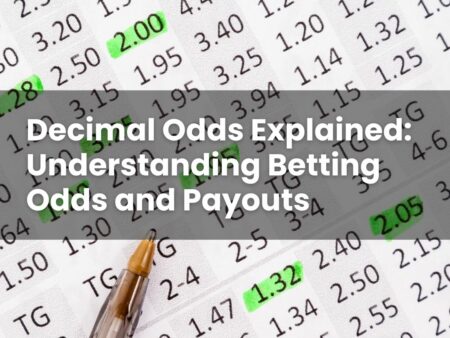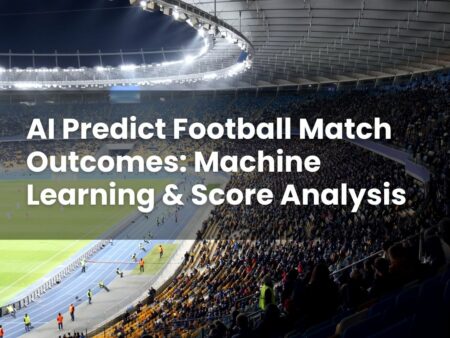Betting systems and algorithms are often spoken about in the world of sports betting, yet many people are unsure what these terms really mean.
This guide explains how betting algorithms work and how they differ from betting systems. By understanding how data and decision-making tools help shape odds, you can recognise how bookmakers set their prices and why outcomes in sport can still surprise you.
The aim is to make sense of the technical side of betting without any jargon, giving you a clear and factual picture of what these systems actually do in the UK betting industry.
What Is a Betting Algorithm?
A betting algorithm is a set of computerised instructions designed to process information and estimate probabilities. In simple terms, it is a mathematical formula that analyses data such as previous match results, team performance, or race times, then uses that data to calculate how likely different outcomes are.
For example, a football betting algorithm might review the last ten matches for both teams, the number of goals scored, injuries, and whether a team is playing at home or away. From this, it might estimate that Team A has a 60% chance of winning. However, a 60% probability still means there is a 40% chance the team may not win — so outcomes remain uncertain.
Bookmakers use algorithms to help make sense of large amounts of data quickly. Instead of relying on guesswork, these systems apply consistent calculations to determine odds that reflect the probabilities as accurately as possible.
How Do Betting Algorithms Work in Sports Betting?
In sports betting, algorithms collect and process detailed information about teams, players, and conditions that may influence a result. This data might include:
- Previous results and scoring averages
- Player injuries or suspensions
- Weather conditions
- Referee statistics and historical trends
The algorithm combines these details to estimate the probability of each possible outcome — for example, a home win, away win, or draw. Once probabilities are estimated, bookmakers convert them into decimal or fractional odds.
If an algorithm calculates that an outcome has a 50% probability, the “fair odds” would be 2.00 in decimal format (or evens). However, bookmakers include a margin (known as an overround) to help maintain business sustainability. This means the actual offered odds might be slightly lower, such as 1.91.
Algorithms also help update odds in real time. During live events, they respond to changes such as goals, red cards, or injuries. In football, for instance, a red card to one team can significantly shift the potential outcome, so the algorithm adjusts prices accordingly.
Even the most advanced systems cannot predict every variable. Sport involves unpredictable moments. Algorithms simply provide a structured way to assess probabilities, not guarantees.
Why Do Bookmakers Use Betting Algorithms?
Bookmakers rely on algorithms to manage vast amounts of information efficiently and consistently. With hundreds of sporting events taking place each day, automated systems are essential to ensure prices remain accurate and competitive.
An algorithm helps a bookmaker:
- Gather up-to-date data from trusted feeds
- Apply mathematical models to estimate probabilities
- Adjust prices when new information becomes available
For instance, if a key player is ruled out minutes before kick-off, the bookmaker’s algorithm can recalculate odds almost instantly. This allows the operator to offer fairer markets without the delay of manual recalculations.
Different bookmakers use their own models, data sources, and commercial strategies. This is why prices for the same event may differ slightly between sportsbooks. These differences reflect how each bookmaker interprets the available information, their margin policies, and their exposure to certain outcomes.
Bookmakers licensed in the UK are regulated by the Gambling Commission. They must ensure that bets are offered transparently and that their systems meet fairness and reliability standards.
What Data Do Betting Algorithms Take Into Account?
The specific data used by an algorithm depends on the sport or market being analysed. In football, for example, algorithms may consider:
- Win–loss records across home and away matches
- Average goals scored and conceded
- Current player form and availability
- Tactical formations or managerial changes
In horse racing, models might assess:
- Previous race times and distances
- Jockey and trainer statistics
- Ground conditions and weather
- The horse’s performance at similar tracks
The goal is to try and identify measurable relationships that can help estimate probabilities. Some operators might also monitor how betting markets move elsewhere, comparing their internal models with competitor prices to maintain balance.
For fixed-odds casino games, the data is mathematical rather than historical. The probabilities are based on the game’s design — for example, a 48.6% probability of landing on red in European roulette — and these figures remain constant, regardless of any previous spins.
Although algorithms use data from professional feeds and analysis tools, they still operate within uncertain environments. Sport can be influenced by decisions, weather, or individual performance that cannot be predicted with full accuracy.
Are Betting Algorithms Always Accurate?
No algorithm can predict a result with complete accuracy. Their purpose is to estimate probabilities based on evidence, not to foresee outcomes. Even if a bookmaker’s algorithm estimates a 70% probability for one team to win, there remains a 30% probability that it will not happen.
Sporting events involve unpredictable elements — such as a referee’s decision, player error, or injury — that cannot be modelled precisely. This uncertainty is what makes betting a form of gambling, rather than a precise calculation.
Bookmakers frequently update and test their algorithms against real results to ensure they remain statistically reliable. However, differences between models, data quality, and assumptions mean prices will not be identical across bookmakers. Comparing odds between operators can help you understand how opinions can differ on the same event.
Betting Algorithms vs Betting Systems: What Is the Difference?
A betting algorithm and a betting system are not the same thing, though they both involve structured decision-making.
- Betting algorithms are automated and data-driven, designed to calculate probabilities or set odds. They are typically used by bookmakers or professional analysts.
- Betting systems are strategies that individuals follow when placing bets. For example, some systems suggest increasing or reducing stakes after wins or losses, or choosing specific types of markets to focus on.
While algorithms rely on statistical modelling, betting systems depend on personal rules or patterns of behaviour. Neither can remove the element of chance involved in gambling. Understanding the difference can help you recognise that even well-organised strategies cannot ensure profit.
Can Players Use Betting Algorithms Themselves?
Some bettors choose to build their own basic algorithms or follow structured systems to help guide their decisions. This might involve using spreadsheets, public statistics, or prediction software. More advanced tools may use machine learning or statistical packages, but these require technical knowledge and reliable data.
The complex algorithms used by major bookmakers are not publicly available. These rely on paid data feeds, specialist staff, and infrastructure designed to process thousands of markets simultaneously. Publicly available prediction models can be interesting to explore, but they are not guaranteed to produce accurate results.
If you decide to use data or models when betting, it can be useful to:
- Set a clear spending limit before you start
- Treat the activity as entertainment, not a source of income
- Take time away from betting if you feel it is affecting you
In the UK, licensed operators must provide access to safer gambling tools and support. If betting ever starts to feel difficult to manage, free confidential help is available through professional services.








